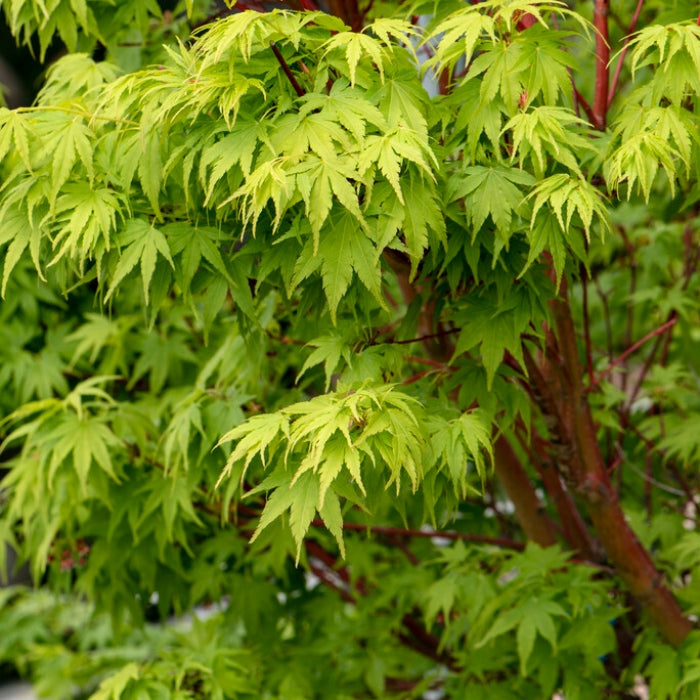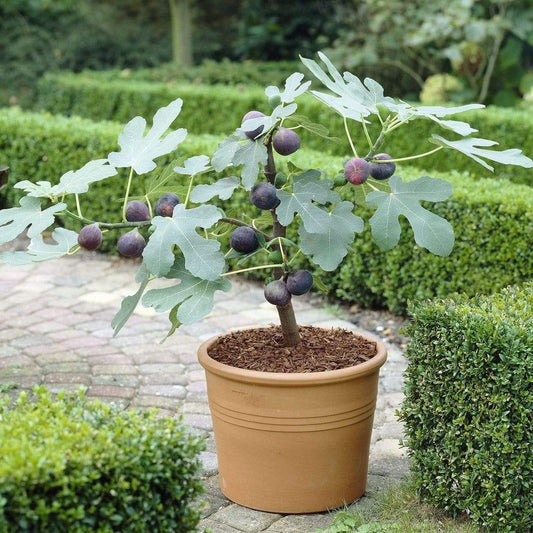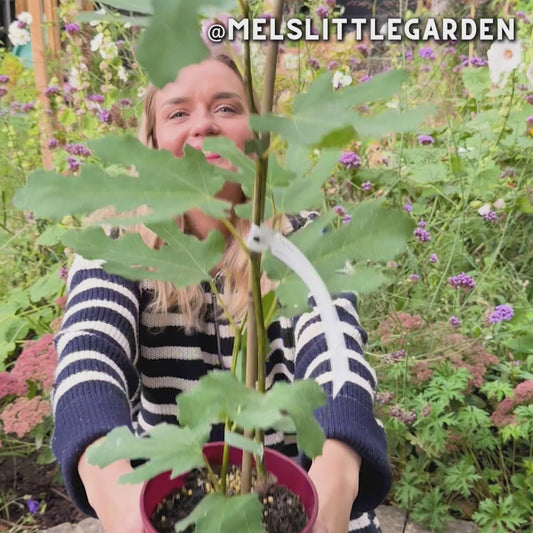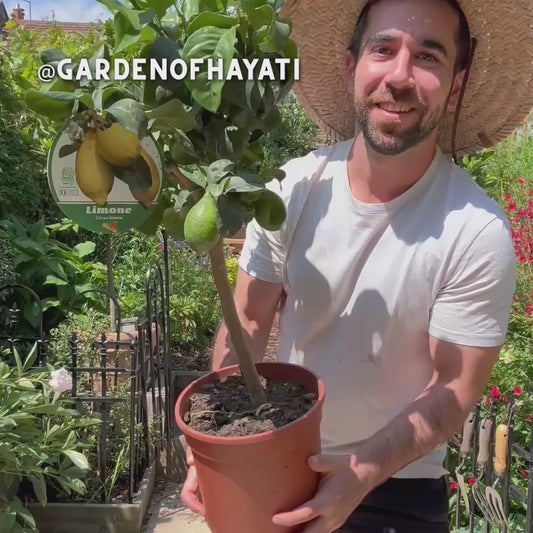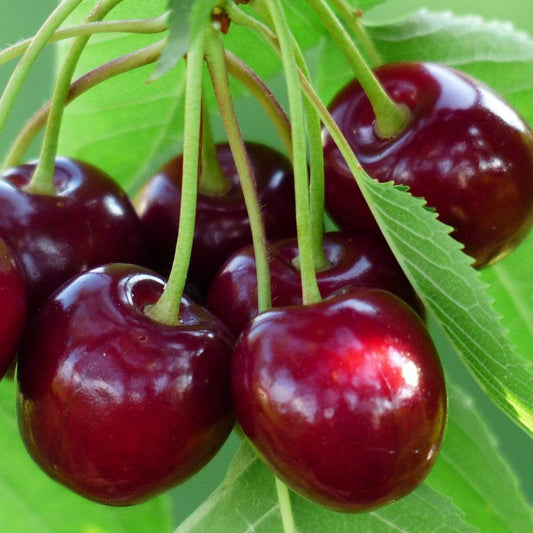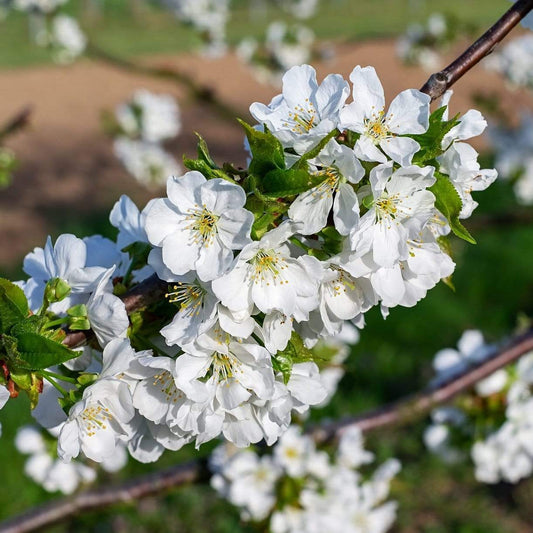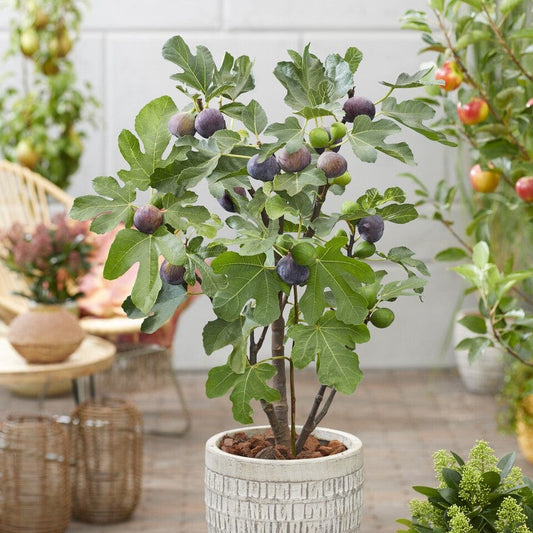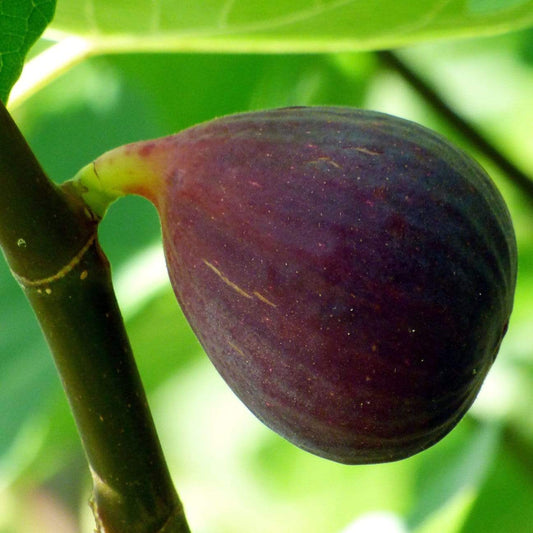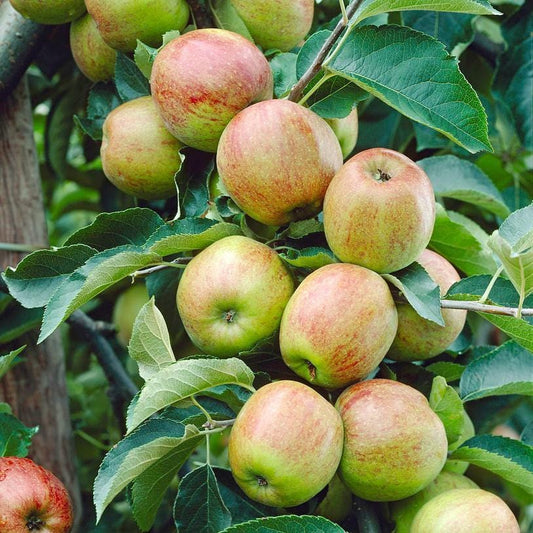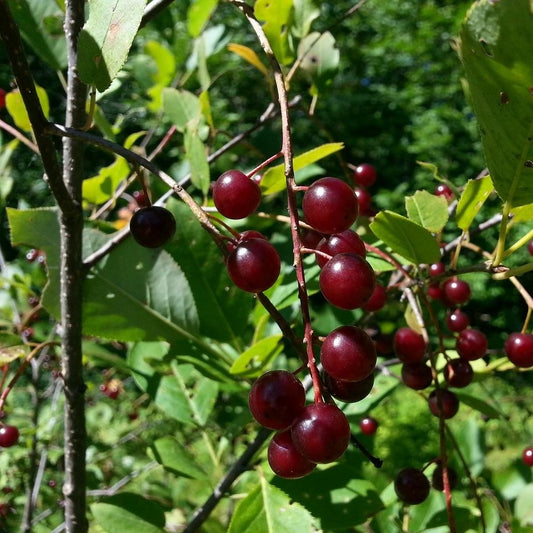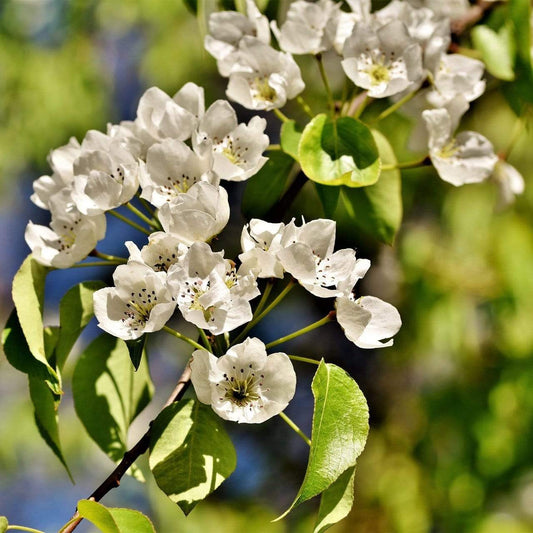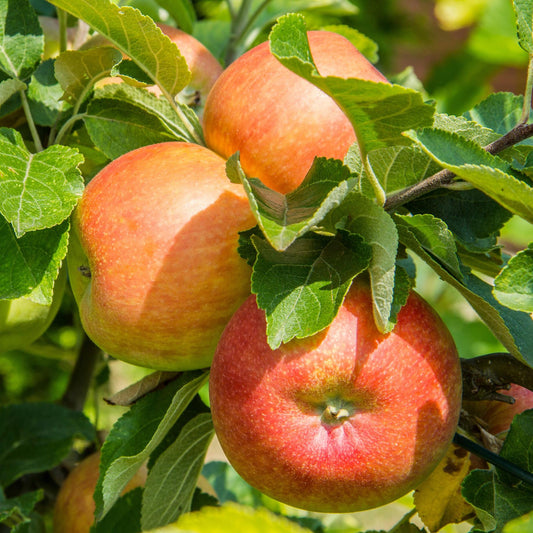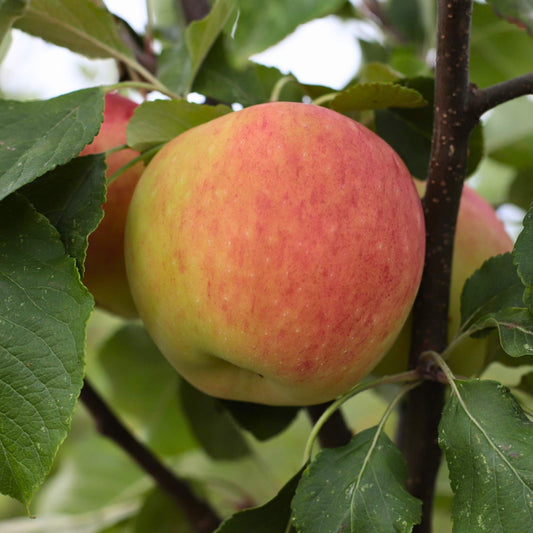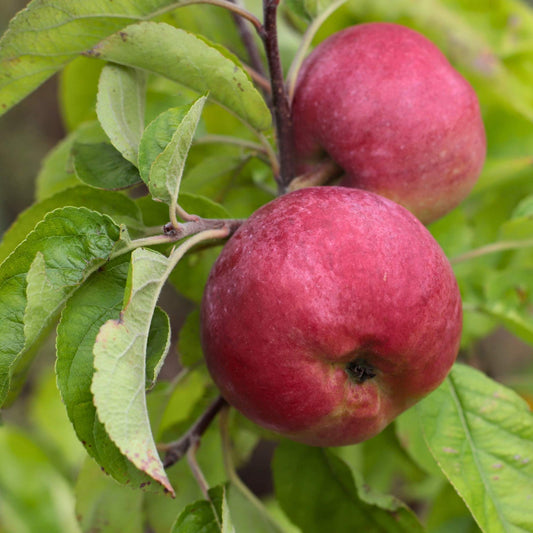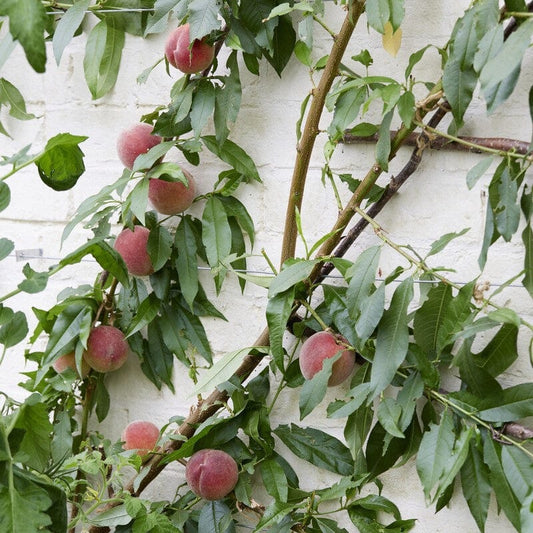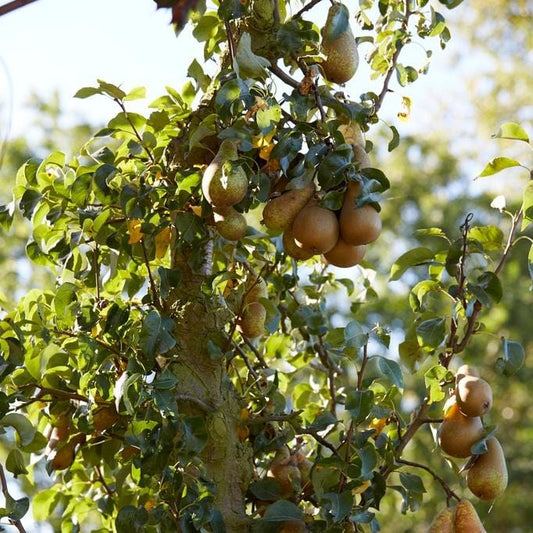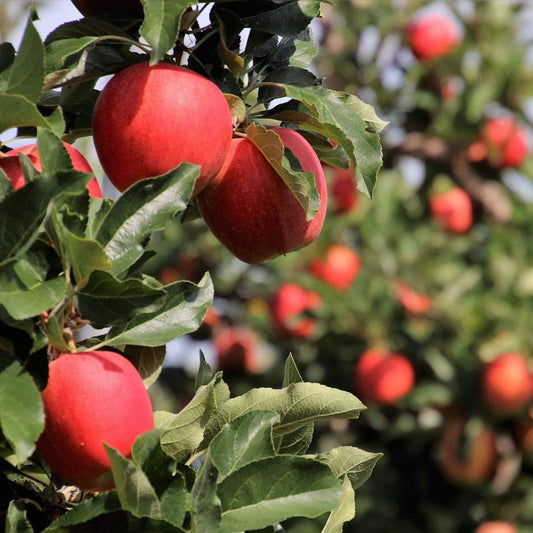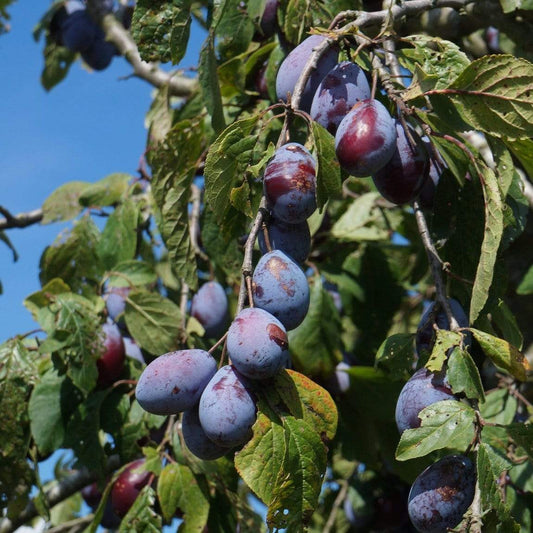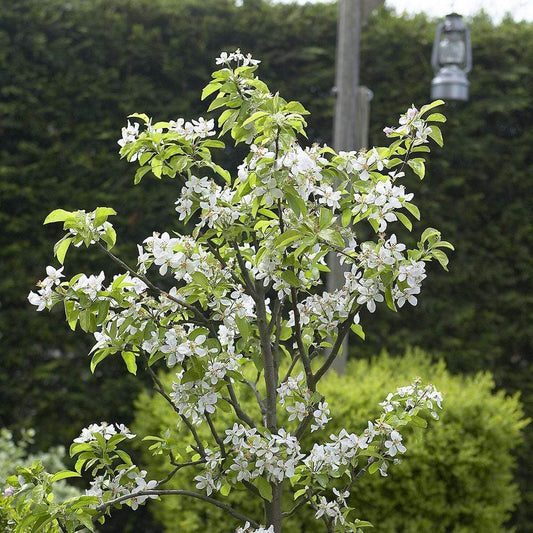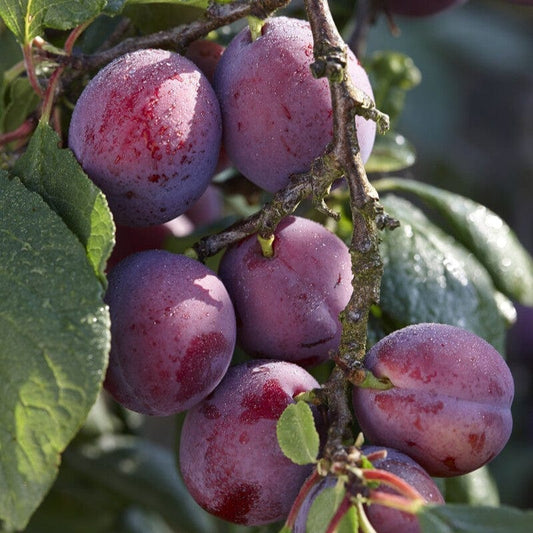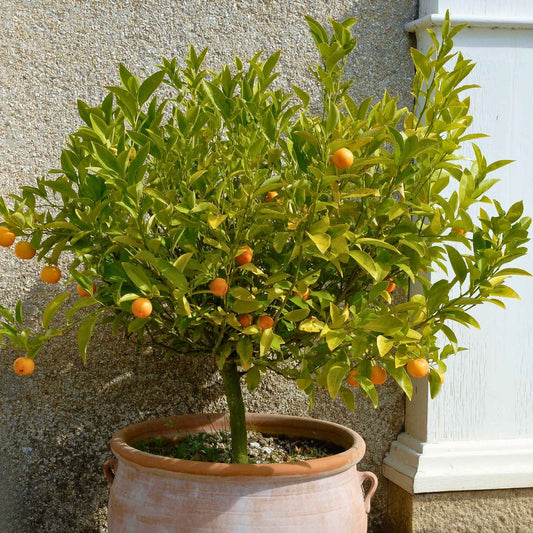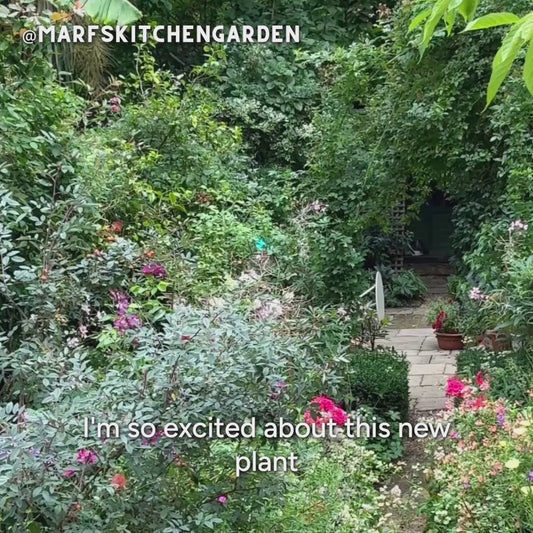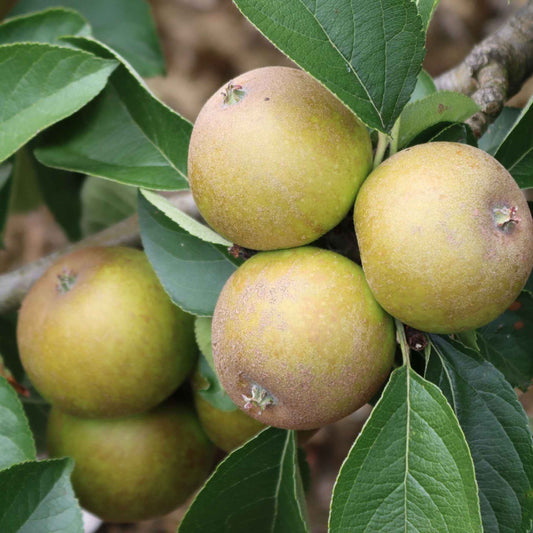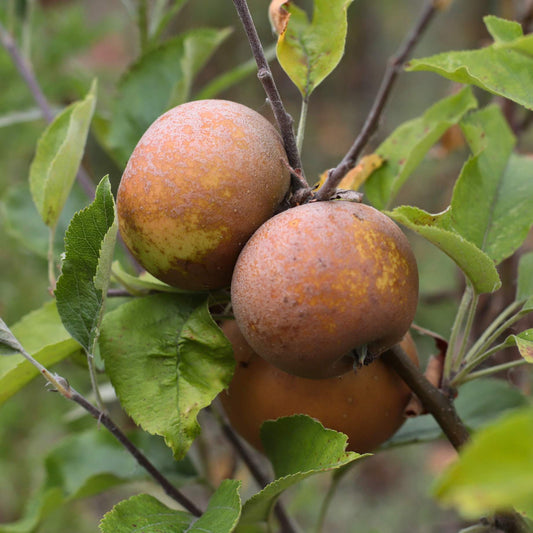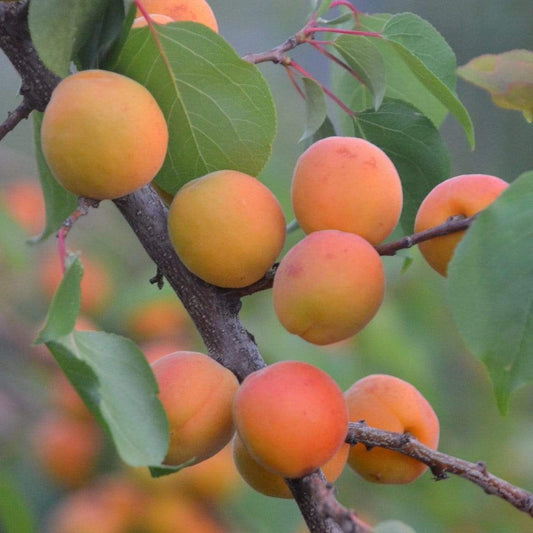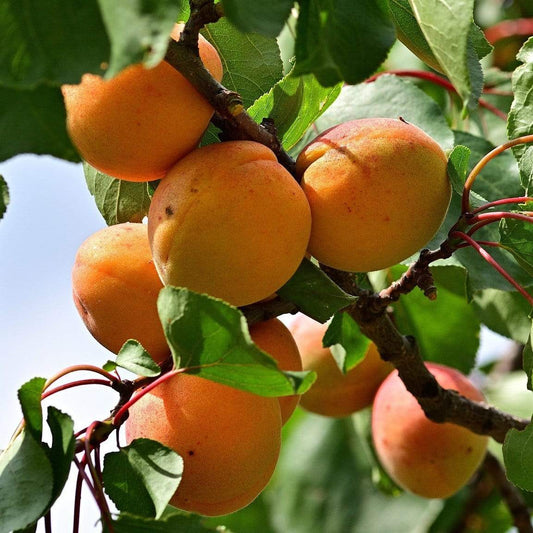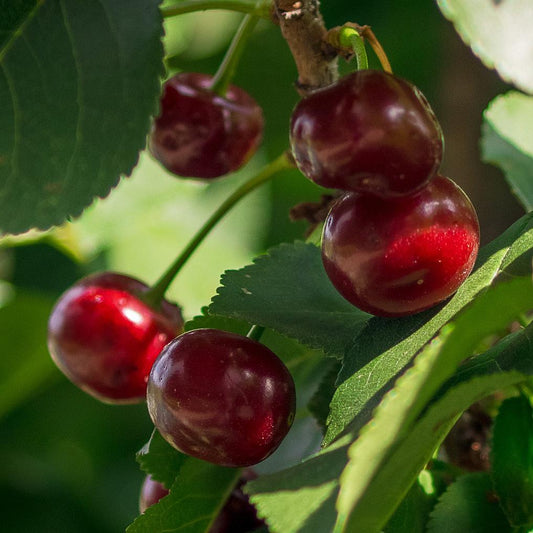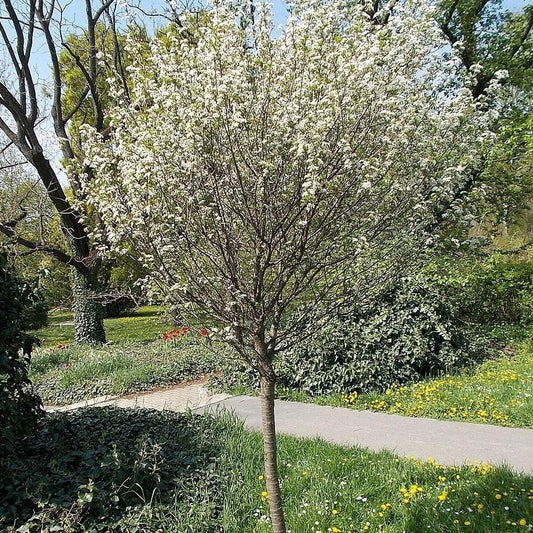Collection: Fruit Trees
We consider ourselves a bit of a fruit tree specialist here at Roots. We've got vast experience growing some of the UK's very finest fruit trees, and have curated a selection of the best varieties, each with something unique about them. Grown in the fertile soils and favourable climate of the Vale of Evesham, we give your fruit trees the best possible start in life. We'll also help you with everything you need to know about choosing, growing and caring for fruit trees.
Need help picking?-
Regular price From £20Regular price
£22Sale price From £20UK Hardy Fig Tree | 'Brown Turkey'
By far the best fig for the UK
- Boasts a traditional, sweet figgy taste
- Fully hardy and well-suited to the UK climate
- Caramelise and serve with balsamic vinegar
- Pick in August and September
4 options available
-
Regular price From £32Regular price Sale price From £32
'Victoria' Plum Tree
Plums fit for a queen
- The iconic plum with a superb flavour
- Damp, cold or partial shade? No problem
- Makes the perfect plum frangipane
- Harvest from late August onwards
6 options available
-
Regular price From £25Regular price Sale price From £25
Grafted Patio Lemon Tree | 4 Seasons Lemon
Zingy lemons all year round
- Evergreen foliage and fragrant flowers
- Grafted for stronger growth
- Make the best lemon meringue pie!
- Fresh, zesty fruits throughout the year
4 options available
-
Regular price From £30Regular price Sale price From £30
'Sunburst' Cherry Tree
A superb dark cherry
- Decadent and devilishly rich
- Self-fertile (doesn't require a partner)
- Ideal for morning smoothies
- Harvest from mid-July
4 options available
-
Regular price From £33Regular price
£38Sale price From £33'Conference' Pear Tree
The UK's favourite pear
- Soft, sweet and succulent
- RHS Award of Garden Merit winner
- Eat straight from the trug!
- Harvest from September
6 options available
-
Regular price From £30Regular price Sale price From £30
'Braeburn Hillwell' Apple Tree
A sport with improved colour
- Fresh, aromatic taste (eating)
- Lovely and low maintenance
- Bite into fresh and savour the fab flavour!
- Harvest from October to early November
4 options available
-
Regular price From £22Regular price
£24Sale price From £22'Osborn's Prolific' Fig Tree
One heck of a lot of figs!
- Rich, sweet, melt-in-the-mouth flavour
- Among the most heavily-fruiting fig trees
- Try making a scrummy fig tarte tatin
- Figs ready to pick from August to September
2 options available
-
Regular price From £30Regular price
£38Sale price From £30'Stella' Cherry Tree
A familiar old favourite
- The perfect balance of sweet and tart
- RHS Award of Garden Merit winner
- Serve with ice cream and dark chocolate
- Harvest from late July to August
4 options available
-
Regular price From £28Regular price Sale price From £28
'Bramley's Seedling' Apple Tree
The UK's favourite cooking apple
- Sharp, cooks down to a rich flavour (cooking)
- A reliable heavy cropper
- If you want apple pies, come this way...
- Harvest from September (keeps to February)
7 options available
-
Regular price From £32Regular price Sale price From £32
'Cox's Orange Pippin' Apple Tree
A British classic!
- Wonderfully aromatic (eating)
- Tastes 10x better than supermarket bought
- Delicious eaten fresh or pressed for juice
- Harvest from September to October
3 options available
-
Regular price From £32Regular price
£36Sale price From £32'Morello' Cherry Tree
Make the ultimate cherry pie
- The best sour cooking cherry
- RHS Award of Garden Merit winner
- Perfect for a black forest gateau!
- Harvest from late July to August
3 options available
-
Regular price From £33Regular price Sale price From £33
'Green Williams' Pear Tree
A favourite since the 1700s
- Bursting with juice and sweetness
- Tried-and-trusted heritage classic
- Excellent for poaching (or eating fresh)
- Harvest from late August
4 options available
-
Regular price From £32Regular price Sale price From £32
'James Grieve' Apple Tree
Disease-resistant and delicious
- Sharp early apples, sweet later (dual)
- Award winner, renowned for its juiciness
- Makes great pies and crumbles
- Harvest in September
3 options available
-
Regular price From £22Regular price Sale price From £22
'Madeleine Des Deux Saisons' Fig Tree
Grown in the Versailles gardens!
- Sweet with undertones of strawberry
- Often produces two crops per season
- Bake a fig, coffee and hazelnut cake
- Harvest in July and again in September
2 options available
-
Regular price From £36Regular price Sale price From £36
'Old Greengage' Plum Tree
An incredible heritage variety
- Rich, candy-sweet and tender
- A truly reliable cropper
- Superb eaten fresh
- Harvest from August
1 option available
-
Regular price From £23Regular price
£35Sale price From £23'Discovery' Apple Tree
Loved by pollinators and the RHS
- Sweet with a slight acidity (dual)
- Incredibly easy to grow
- Eat fresh, puree or press for juice
- Harvest from August (keeps for two months)
6 options available
-
Regular price From £55Regular price Sale price From £55
'Avalon Pride' Peach Tree
A fantastic American variety
- Juicy, sweet and refreshing
- Resistant to leaf curl
- Make a tall glass of peach iced tea!
- Harvest in August
3 options available
-
Regular price From £30Regular price Sale price From £30
'Opal' Plum Tree
As stunning as a precious stone
- Aromatic, juicy and flavourful
- Fast-growing and early-cropping
- Bite-sized fruit, makes a topnotch crumble
- Harvest from late July to early August
2 options available
-
Regular price From £40Regular price Sale price From £40
'Peregrine' Peach Tree
A hardy and reliable cropper
- Rich, luxurious flavour
- Freestone (flesh falls easily away)
- Create a peach and chilli chutney
- Harvest in August
2 options available
-
Regular price From £37Regular price Sale price From £37
'Concorde' Pear Tree
Easy to grow with superior taste
- Sweet, crisp and devilishly moreish
- Reliably regular cropper
- Eat fresh, poach, roast or bake
- Harvest from September (stores well)
2 options available
-
Regular price From £35Regular price Sale price From £35
'Gala' Apple Tree
Makes a wonderful apple sauce
- Crisp with a mild, sweet flavour (eating)
- Very disease resistant and easy to grow
- A delicious, mid-morning pick-me-up
- Harvest in September (keeps for months)
2 options available
-
Regular price From £32Regular price Sale price From £32
'Merryweather' Damson Tree
The largest damson variety
- A naturally tart, tangy flavour
- Grows well in cold and wet climates
- This iron-rich fruit makes great jam and wine
- Harvest from late August
3 options available
-
Regular price From £32Regular price
£36Sale price From £32'Jubilee' Plum Tree
Even better than Victoria?
- A well-balanced, complex flavour profile
- Notably large fruits
- Makes a fabulous plum pie
- Harvest from mid-August
2 options available
-
Regular price £40Regular price
£60Sale price £40Patio Orange Tree | Sweet Orange
Scented blossoms, juicy fruits
- Sumptuously sweet and juicy
- Wonderfully fragrant flowers
- Eat fresh, juice or slice and candy in sugar
- Glossy evergreen foliage
1 option available
-
Regular price From £37Regular price Sale price From £37
'Egremont Russet' Apple Tree
Apple enthusiasts love this tree
- Soft flesh with a nutty flavour (eating)
- World-renowned heritage apple
- Serve with cheese and walnuts!
- Harvest from late September (stores well)
2 options available
-
Over 80 years of experience goes into growing every one of our British fruit trees
-
Regular price From £50Regular price Sale price From £50
'Tomcot'® Apricot Tree
New, heavy-cropping variety
- Bold apricot flavour and juicy flesh
- Produces large fruits (and is reliable)
- Bake a chocolate and apricot cheesecake
- Harvest in August
2 options available
-
Regular price From £38Regular price Sale price From £38
Lapins 'Cherokee' Cherry Tree
Late-cropping, Canadian variety
- Aromatic flavour after the initial sweet hit
- RHS Award of Garden Merit winner
- Two words: cherry scones
- Harvest in July (freezes well)
1 option available
Roots' Cotswolds Valley Nursery
Meet Mike
Tree-growing skills honed right across the globe
Having started out in Australia, studied in Northern Ireland and volunteered at an organic farm in Sweden, it’s fair to say Mike’s done his fair share of travel on his horticultural journey, so far! Having happily laid down roots here at Roots, Mike is the don behind our tree-growing operation, imparting each and every one of his globally-honed skills to benefit your garden. Grown in our purpose-built nursery, in the ideal climatic conditions of the fertile Vale of Evesham, we’re proud to supply only the happiest, healthiest and hardiest trees.
Need help picking?

The easiest fruit trees to grow
For maximum crops with minimum effort, pick one of our growers’ easiest fruit trees. These are the tried-and-trusted varieties that will give you a good crop year after year, winning RHS awards and more importantly, our growers' seal of approval! Our fruit tree experts grow over 100 varieties a year; for easy growing and fantastic flavour, they recommend 'Discovery' (eating) and 'Grenadier' (cooking) apples, 'Green Williams' and 'Conference' pears and 'Victoria' plums. They’re hardy to the cold, disease-resistant and light on the pruning duties. What’s more, they’ll produce plentiful crops earlier than most.

Growing fruit trees in pots
Don’t have space for an orchard? Pick one of our specially-trained patio trees and grow it in a pot. Cherries, apricots, apples, pears and plums will thrive and produce good crops in containers (and figs even prefer them) but you’ll need to choose the right one. For the best results, plant your tree in a container that’s at least 30cm deep and wide, position it in a sunny, sheltered area (patios, balconies and decks are all good) and make sure you water and feed it regularly. If the weather’s looking a bit frosty, no problem - simply move your pot indoors.

Unusual fruit trees to grow
Want to impress your friends with something a bit different? Grow an 18th century apple tree or a plum dating back to the 1400s. These well-kept secrets are big on flavour and they’ve been grown for centuries by those in the know. Or how about trying a medlar, mulberry or quince tree? They’re all hardy and productive in the UK, make a perfect talking point for your garden and deserve to be better known. You won’t find these heritage fruits in the shops either, so as well as getting tastier produce, you’ll be helping to preserve these traditional varieties for future generations.
Fruit Tree FAQs
What is the easiest fruit to grow?
We took this very question to our fruit tree growers, and they recommend starting with apples like 'Discovery', pears like 'Green Williams' and plums like 'Victoria'. For more, see their full shortlist.
When to plant fruit trees
There are two options when it comes to planting fruit trees. Potted versions can be planted any time of year, but they’ll need more watering and care in the heat. Bare root versions are delivered without soil while the tree is dormant, around November to March, and should be planted during this time. They’re generally cheaper and a bit easier to get established.
Where to plant fruit trees in the garden
Most fruit trees benefit from being in a sunny position, at least for a healthy portion of the day (preferably at least six hours), and relatively sheltered from wind to avoid all the flowers being blown away before they get pollinated. Also, check whether your tree needs a pollination partner (if you're in a remote area where there aren't any other fruit trees for a mile) or is self-fertile.
How far apart should I plant fruit trees?
It’s important to leave space between trees so their roots and branches have enough room to spread as they grow. Check the guidance for each tree to get an idea of its eventual size; the distance between trees should be at least as much as each tree’s eventual spread. This can be as little as one-and-a-half metres for trees with very dwarfing rootstocks, or as great as eight metres for vigorous trees.
What is the fastest-growing fruit tree?
The fastest fruiting trees include pears, apples and figs, with a substantial crop three to four years after planting. For even faster harvesting, you could plant berries, which can bear fruit within the first year.
How much sun do fruit trees need?
Fruit trees need about six to eight hours of direct sunlight to produce a good crop, though with cooking varieties you can get away with a little less.
What are dwarf fruit trees?
Dwarf fruit trees are varieties bred to maintain a compact size, in part by grafting the tree to a dwarfing rootstock. This makes them ideally-suited to smaller gardens or even growing in pots.
How many fruit trees make an orchard?
There are no hard-and-fast rules, but generally a group of five or more fruit trees can constitute an orchard. We recommend planting a variety of fruits so you can enjoy a more varied harvest and foster greater resistance to pests. Check out our mini orchard pack to get started.
What tree can grow multiple fruits?
Trees won’t naturally grow more than one variety of fruit, but sometimes growers graft multiple stems onto one rootstock, producing a ‘family’ fruit tree.
Happy plants make happy customers
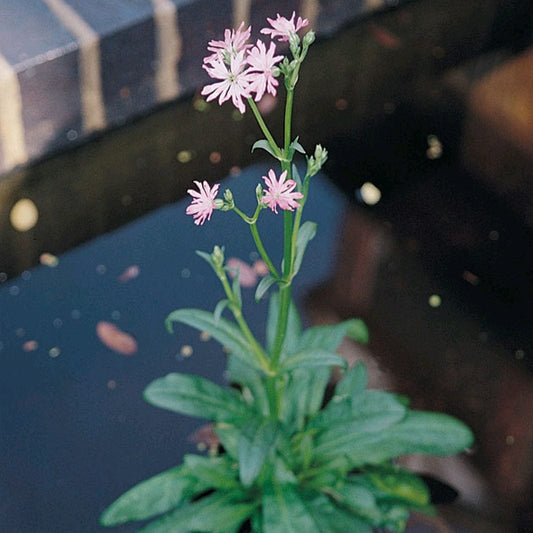
Plants arrived in great condition and very promptly. Well established - much better than the ones I got at my local garden centre.
Monica Spence
| 24 May

Yet again this company delivered good healthy plants, exactly as shown in photos, well packaged and within delivery time quoted. Recommend!
Jacqueline Burgess
| 2 Jun
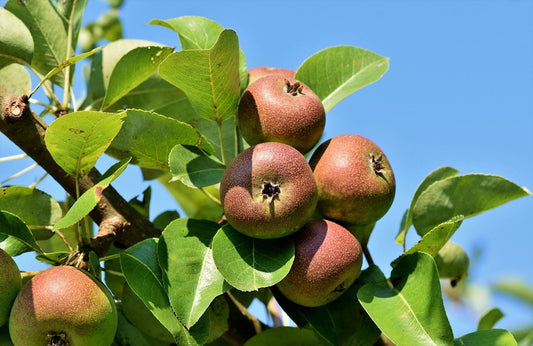
I continue to be so impressed with Roots. Their customer care, knowledge of their subject: from planting hedges to pruning roses and more, has been a great support.
Judy Lane
| 23 Oct
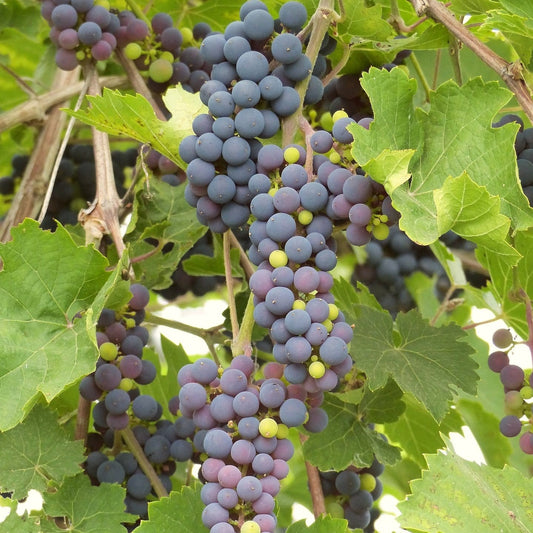
The plant arrived looking vigorously healthy, which brings a smile to your face, extremely well protected in its packaging.
Martyn Hill
| 5 Jul
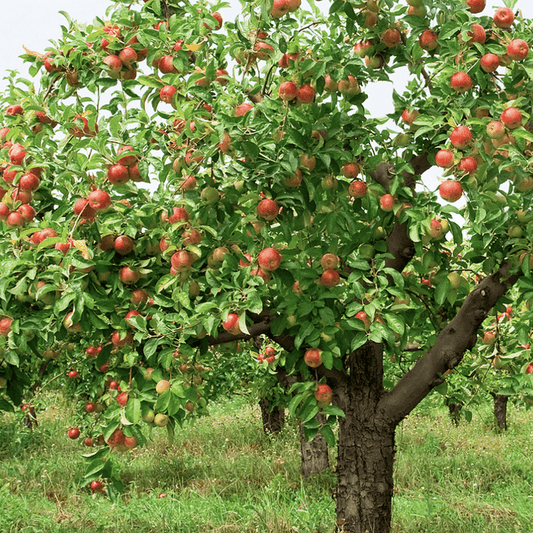
As a non-gardener, I found my whole experience brilliant. Great information & advice available on the website, great range of products & prices are brilliant.
John-Paul
| 22 May

Wonderful plants and great customer service... really surprised to find that the plants are better than those you would get at your local garden centre.
Gavin Wilcock
| 8 Nov
Fighting plastic waste
Delivering fresh from the nursery
Supporting UK growers
